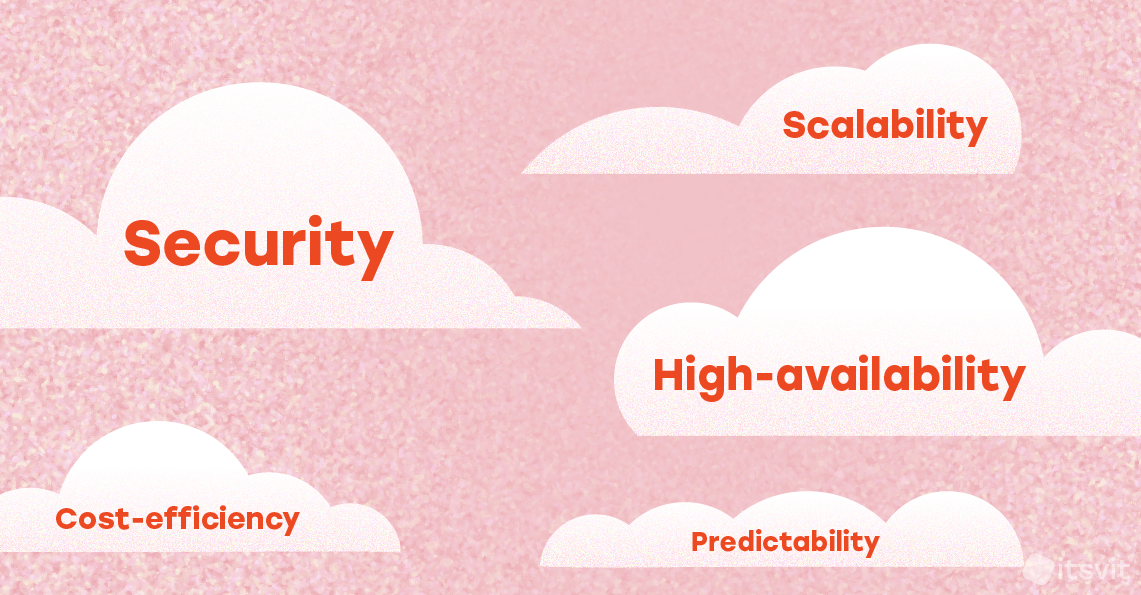Cloud services for food delivery companies from IT Svit
Various food delivery companies in the US and worldwide move their operations to the cloud to gain more operational flexibility. IT Svit helps achieve this result and provides dedicated teams that configure the cloud for food delivery businesses.
Food delivery is a highly competitive business that must be flexible to ensure quick stock turnover and cost-efficient operations. Running IT operations systems in the cloud is obviously the best choice for a food delivery service. IT Svit helps configure cloud services for food delivery applications to ensure maximum resilience, scalability and high-availability of your operations.
Infrastructure management and cloud backup for food delivery companies
Personnel of food delivery companies must be able to access your systems from the office, from their smartphones or tablets in the cars or even get notifications to their smartwatches. This means your app must run in the cloud to ensure ease and speed of access, high velocity of information updates and secure cloud backup for operational data. IT Svit helps configure cloud services for food delivery apps for top-notch performance.
Optimizing cloud computing for food delivery app development
To remain competitive and ensure uninterrupted value delivery for both your team and your customers, you should ensure the feedback loops are as short as possible. This means the process of implementing feedback and adding new features must take the least time. This is possible if your team benefits from CI/CD pipelines powered by cloud computing features. IT Svit can configure these pipelines to minimize the time-to-market for your product updates.
We provide managed cloud services for food delivery companies
In the fast-paced business world of the 21st century, the only way for a business to survive and succeed is to remain competitive and utilize every possible advantage. Cloud computing is one of such advantages, quickly becoming a necessity for goal-oriented businesses. By running applications and systems in the cloud, every company ensures resilience and security, manageability and cost-efficiency of operations. This is especially so for food delivery services, as successfully running such a business requires using a complex software ecosystem spanning both office workspaces and mobile devices like smartphones and tablets.
Your delivery trucks must get live updates on the traffic situation and the resupply schedule during the day. Your office personnel must keep track of the food supplies in the warehouses and direct the trucks there in such a way as to ensure optimal loading speed and traveling routes. Your teams must remain in touch all the time in case the situation changes rapidly, etc. It is obvious that the reliability and speed of software operations and communication systems are essential for the success of such a business.
Cloud computing provides all the advantages listed above — if one has the expertise required to leverage them.
- Scalability. Cloud resources are rented in virtual instances with configurable quotas. These quotas can be increased on-demand, ensuring your business always has exactly as many resources as it needs.
- Security. Cloud platforms provide a wide variety of security features, both structural — like private subnets and bastion hosts or Docker containers, and procedural, like Google Stackdriver or Amazon CloudWatch web services. Storing data in the cloud is the most secure way of keeping your sensitive information (like billing data and personal details of your customers) safe.
- High-availability. Unlike dedicated servers with limited throughput, cloud virtual machines provide literally unlimited connectivity. Most importantly, your applications can run in the cloud availability zones closets to your area of operations to ensure minimal latency and stable uplink for all the devices involved.
- Cost-efficiency. Cloud services are rented under the Pay-As-You-Go billing model, meaning you pay only for the resources consumed. Thus said, you can configure your cloud instances to provide the absolute minimum of resources required to run your systems and develop your applications. Then you can easily scale the system up and down as needed, to ensure maximum cost-efficiency of your cloud investments — unlike dedicated bare-metal servers, which you buy or rent and pay for their operations 24/7, regardless of if you actually use them to full capacity.
- Predictability. Due to DevOps automation of cloud infrastructure management, you can minimize the time needed to provision and configure new virtual environments or perform some routine operations, like cloud backup for food delivery apps. Therefore, the software development process becomes much more reliable and predictable, allowing you to implement customer feedback and update your systems.
All of this is possible due to three basic DevOps principles that enable the automation of software delivery and infrastructure management operations: IaC, CI and CD.
- IaC means Infrastructure as Code. Settings and parameters of all infrastructure environments are codified in a form of textual configuration files, so-called manifests. These manifests are written in simple descriptive language, stored at some Version Control System and can be versioned like any other code. Thus said, a DevOps engineer can prepare these manifests for all repetitive scenarios and easily adjust them to meet the changing requirements.
This simplifies software development and infrastructure management immensely, as all it takes a developer to load the required testing environment and perform automated unit and integrity testing for a new batch of code is just loading the required manifest in a single click. No need to wait for the Ops engineer to provision and configure the required server — and no need for you to pay for this server while it is on standby.
Most importantly, IaC solves the “works on my machine” conundrum, as all the environments are built automatically, using the same Docker images and run in the same Docker containers, so there are no discrepancies between the IDE, testing, staging and production environments and the code works exactly the same on every stage of delivery. This removes the risk of major bugs making it to production and causing post-release system crashes. - CI means Continuous Integration. This principle declares that instead of splitting the project into several long branches and merging them before the release (causing several bugs, some of which can make it to production), your application is developed in small chunks, where new batches of code are continuously integrated into the main project trunk.
This is enabled by IaC, as instead of running a hard-to-reconfigure test server farm, your development team provisions testing environments for themselves in a matter of seconds, uses them to perform automated unit and integrity code tests and pushes the code to the staging server for high-level testing by QA engineers.
This principle works for feedback loops as well, as automating the software delivery and testing through IaC and CI enables you to implement new features based on customer feedback and stakeholder input quite rapidly, in weeks instead of months. - CD means Continuous Delivery. This is the second part of a CI/CD pipeline, an ability to configure the DevOps toolkit and a bunch of cloud-specific web services in such a way, that the outcome of every operation becomes the input of the next operation.
For example, the commit of a new batch of code to the repository launches the appropriate manifest, which creates the required testing environment and the code is run against the automated tests. If the tests succeed, the code is automatically pushed to the staging server, where the latest application build is prepared for testing. If the tests fail, the alert is raised to the developer and the code is given back for bugfixes, reverting the commit. The testing environments are then decommissioned to save resources, till the next time, as it takes only a couple of seconds.
The same approach works for infrastructure management, where multiple operations like cloud backup for food delivery applications and data can be done completely automatically.
However, in order to use these benefits to the full extent, your business must have access to skilled DevOps engineers, who can configure cloud computing for food delivery businesses. IT Svit can help you with this task, as we can provide assistance on every stage of software development and with every aspect of infrastructure management. If this sounds like something you’d expect from your projects — contact us right away and let’s discuss project specifications!

